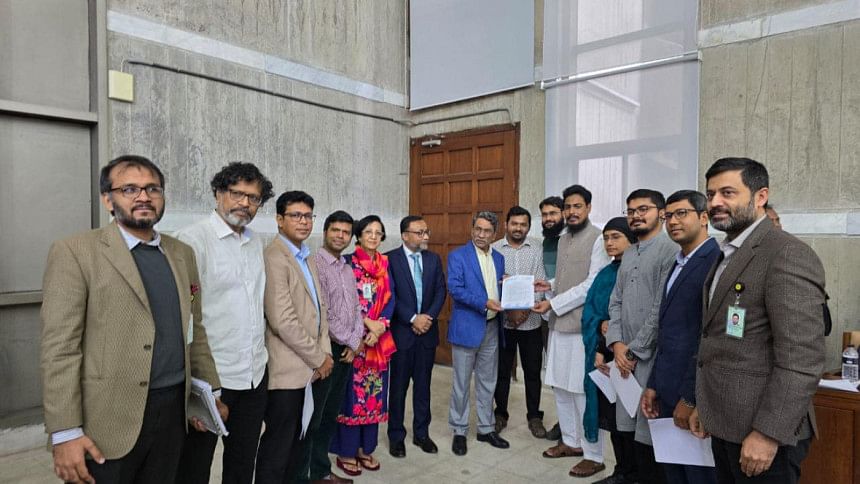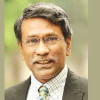Draft a new constitution

The Anti-Discrimination Student Movement and the Jatiya Nagorik Committee yesterday proposed drafting a fresh constitution, formation of a constituent assembly, and recognition of the student-led July-August mass upsurge in the new constitution.
The Jatiya Nagorik Committee proposed that the new constitution include five new fundamental principles -- equality, human dignity, social justice, citizen rights, and democracy -- replacing the existing principles of nationalism, socialism, democracy, and secularism.
It submitted 69 proposals to the Constitutional Reform Commission, while the Anti-Discrimination Student Movement presented its recommendations verbally, saying that a written proposals would be submitted soon.
A delegation, led by Jatiya Nagorik Committee Member Secretary Akhter Hossain and Spokesperson Samantha Sharmin, handed over the proposals.
The committee suggested including the Proclamation of Independence of Bangladesh in 1971 and the Proclamation of the "Second Republic", inspired by the spirit of July-August uprising, in the preamble to the constitution.
It also proposed that the next two national elections be held under caretaker governments.
Reducing the prime minister's powers was also proposed. According to the proposals, the same person cannot serve as the head of the ruling party and the leader of the House at a time.
No individual can serve as president or prime minister more than twice, and a bicameral legislature with a four-year tenure should be established, the committee proposed.
Its Member Secretary Akhtar Hossain, while speaking to reporters, said they believe that the existing constitution has become "invalid" after the uprising that toppled the Hasina-led government.
"It seems that the constitution is a document of the Awami League. The country is yet to reach the desired goal of the mass uprising. We need a new constitution for that," he said, adding that they have proposed drafting a new constitution instead of amending the existing one.
It suggested that the constitution should be amended through referendums, not by a three-fourths vote in the legislature.
The constitution must recognise every ethnic identity, and citizens of Bangladesh should be identified as "Bangladeshis".
The preamble to the constitution must recognise "popular sovereignty".
No articles like 4(A) of the constitution should be included in the new one. The article mandates displaying the portrait of Father of the Nation Bangabandhu Sheikh Mujibur Rahman at all government, semi-government, and autonomous institutions.
Instead, the committee proposed that only the national emblem be displayed at government, semi-government, and autonomous institutions.
The wealth and properties of serving prime minister will have to be placed under the authority of the central bank.
The organisation suggested restricting the rigidity of article 70 and giving more power to parliamentary committees.
Regarding parliament, it proposed that it be bicameral, comprising an upper house named Jatiya Parishad and a lower house named Ain Sabha.
A law should be passed by both upper and lower houses.
The Jatiya Parishad should be elected through the proportional representation system while Ain Sabha would be elected by voting.
Proportional representation is an electoral system in which the distribution of seats corresponds with the proportion of the total votes cast for each party.
Out of the 100 seats at the Jatiya Parishad, at least 33 seats must be for professionals and marginalised groups, including farmers, workers, students, lawyers, doctors, engineers, agriculturists, and journalists.
The opposition will be able to form a shadow cabinet under the leadership of the opposition leader.
Meanwhile, the Anti-Discrimination Student Movement also recommended drafting a new constitution instead of amending the existing one.
A four-member team of the organisation presented its proposals during a discussion with the Constitutional Reform Commission.
After the meeting in the afternoon, Arif Sohel, member secretary of the Anti-Discrimination Student Movement, told journalists that they had presented some proposals verbally.
He added that they plan to submit the proposals in writing soon.
Among their proposals were decentralising the prime minister's powers by granting some authority to the president, creating a bicameral parliament, and establishing a Supreme Judicial Council.
Noted economist Prof Rehman Sobhan and political scientist Prof Rounaq Jahan yesterday also gave their opinions before the Constitutional Reform Commission.
Brig Gen (retd) Mohammad Hasan Nasir, Lt Col (retd) Hasinur Rahman Bir Pratik, Lt Col (retd) Mustafizur Rahman, and retired Commander (BN) Nesar Ahmed Julias also submitted their written proposals on behalf of Justice for Comrades, a platform of retired defence officers.

 For all latest news, follow The Daily Star's Google News channel.
For all latest news, follow The Daily Star's Google News channel. 








Comments